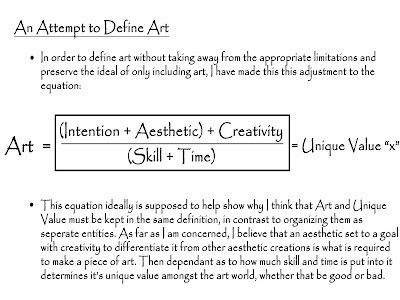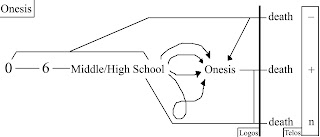As the last post that I am putting up for the class, I wanted to rewrite my theory of human nature on here in case anyone who may have had questions or comments could take them out on here. Also, I would like to point out that I am not done with this blog, when I think of other philosophical things in the future I will still post them here, so feel free to check back here every once in a while to keep your mind busy. Otherwise, thanks for participating :-)
Theory:
:: We exist for a
comparatively short amount of time, and then we die.
:: We spend most of our life chaotically looking for answers about the world around us so that we can happily come to terms with what our life is supposed to be.
:: The path for coming to the complete understanding of these answers comes in three parts for those who are truly looking:
Part 1.
OnesisOnesis (Oh-knee-sis) is a term that I have made up to describe a path of coming to your own true self
maturity; a sort of life epiphany, and this is what it looks like:
This path displays the timeline of an average person on their path to
Onesis. I put the title "middle/high school" on the general age of about 17/18. This is the last part of the graph it is typically
consistent between people, before the amount of time begins to change rapidly between how long it takes to get to the next step. The reason for this is that there is no way of telling exactly how long it will take you to reach
Onesis, and as such, only you can come to this conclusion, for even though I am showing your the path, you are the only person who can discover what it really means.
When
Onesis is understood, what you choose to do with it is up to you, as is represented by the break in the paths, and the symbols at the end of life, which stand for:
(+)
Positive Influence, (-) Negative Influence, and (n)
Neutral Influence... in Life.
These symbols also come with an analogy, where in life you choose to be the Coyote (negative), Sheep (
neutral), or Sheepdog (
positive).
Part 2.
LogosLogos is a word that stand for "word" and "reason", and it has a place on the path of life once
Onesis has been understood. This part of life is when you have reached
Onesis and you are left to choose what you want to do with the rest of your life (i.e. the
Positive or
Neutral path).
Logos is the second part because it represents what you do with
Onesis once you understand it, and it is
separated into its two parts:
:: The term "word" means that you come to understand the language in which you have most versed yourself in (i.e. music, science, art, etc.) and you slowly become more masterful in your capability to create and describe things using that "word".
:: The term "reason" represents the why in your life. Once you come to understand the "word" you are left to choose what you do with it, and reason is there to help you choose your influence on the rest of life.
Part 3.
TelosTelos is the final part of life, and literally means: "end, purpose", and "goal". This has been added to the path of life, because: "By understanding that which life consists of, we
prepare ourselves for death".



